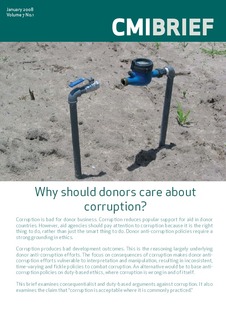| dc.contributor.author | Kolstad, Ivar | |
| dc.date.accessioned | 2018-01-04T08:16:13Z | |
| dc.date.available | 2018-01-04T08:16:13Z | |
| dc.date.issued | 2008-01-09 | |
| dc.identifier | oai:www.cmi.no:2912 | |
| dc.identifier.citation | Bergen: Chr. Michelsen Institute (CMI Brief vol. 7 no. 1) 4 p. | |
| dc.identifier.issn | 0809-6740 | |
| dc.identifier.uri | http://hdl.handle.net/11250/2474600 | |
| dc.description.abstract | Corruption is bad for donor business. Corruption reduces popular support for aid in donor countries. However, aid agencies should pay attention to corruption because it is the right thing to do, rather than just the smart thing to do. Donor anti-corruption policies require a strong grounding in ethics.
Corruption produces bad development outcomes. This is the reasoning largely underlying donor anti-corruption efforts. The focus on consequences of corruption makes donor anticorruptionefforts vulnerable to interpretation and manipulation, resulting in inconsistent, time-varying and fi ckle policies to combat corruption. An alternative would be to base anticorruption policies on duty-based ethics, where corruption is wrong in and of itself.
This brief examines consequentialist and duty-based arguments against corruption. It also examines the claim that "corruption is acceptable where it is commonly practiced." | |
| dc.language.iso | eng | |
| dc.publisher | Chr. Michelsen Institute | |
| dc.relation | CMI Brief | |
| dc.relation | 1 | |
| dc.relation.ispartof | CMI Brief | |
| dc.relation.ispartofseries | CMI Brief vol. 7 no. 1 | |
| dc.relation.uri | https://www.cmi.no/publications/2912-why-should-donors-care-about-corruption | |
| dc.subject | Anticorruption | |
| dc.subject | Donors | |
| dc.subject | Aid | |
| dc.title | Why Should Donors Care about Corruption? | |
| dc.type | Report | |
